BYGONE DAYS OF YORE: 1900 - ‘British empire has once more found itself endangered’
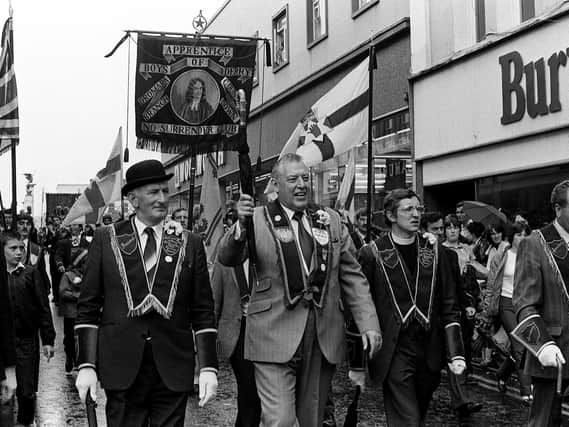

Once more the British Empire stood at a crucial great juncture of its existence and this was a message that was reiterated at the walls of Londonderry but on the day fine weather favoured the Apprentice Boys of Derry on their big day even though in the early hours it had threatened to cloud over and be a wash out but the sun shone as the Apprentice Boys marched.
Apprentice Boys from Belfast were well represented at the commemoration and they were joined by brethren from across Ulster including Lurgan, Portadown, Ballymena and Larne.
Advertisement
Hide AdAdvertisement
Hide AdThe procession started shortly after 2pm from the Mall Wall and entered the city via Bishop’s Gate before proceeding down Shipquay Street, along Strand Road, up Clarendon Street, down James Street, then up Shipquay Street, through Ferryquay Street and via Abercorn Road and Bishop Street and back to the walls.
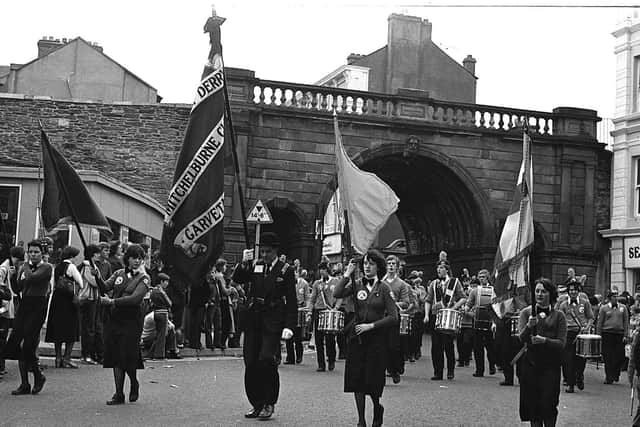

The News Letter correspondent noted: “The procession as it passed though the city presented a most imposing appearance with its numerous crimson flags flying in the summer breeze and bands playing patriotic airs.”
After the procession the Apprentice Boys gathered at Mall Wall where they were addressed by the governor John A Alexander, JP. He used his speech to welcome all those who had travelled from outside of Londonderry for the day’s celebrations and said that they hoped that what they had seen of the Maiden City had impressed them.
He added that he had been struck by the “fine order” of the ranks of the Apprentice Boys who had marched through the city. He then passed several remarks of condolences on the death of Bro William Johnston MP who had died in the United States while on Order business.
Advertisement
Hide AdAdvertisement
Hide AdCharles O’Brien, of Eglinton, moved a vote of sympathy and condolence to the family of the late MP. He remarked that no one had done more for the Apprentice Boys and the Orangemen of the city than Mr Johnston.
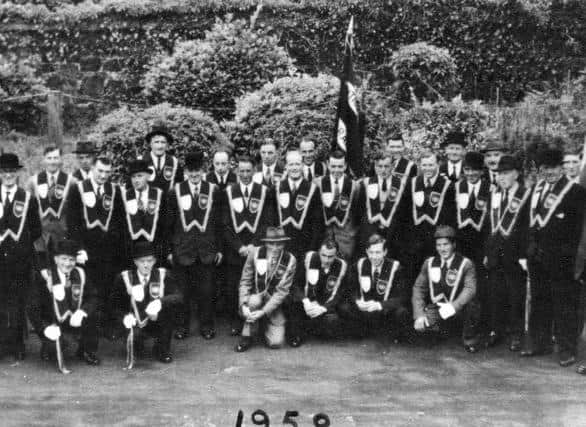

He said: “In the troublesome days gone by Bro Johnston had never hesitated to stand by his fellow Orangemen and had given us great assistance in the struggle in which we are engaged.
Next to speak was the Rev John Moutray of Richmount, Ballygawley, who had known Mr Johnston for the last 31 years. The resolution was then passed unanimously.
On the motion of John Guy Ferguson, seconded by Dr Thompson of Ballyarnett and supported by the Rev Moutray and Mr O’Brien the following resolutions were also passed: “That the best thanks of the Apprentice Boys of Derry are due to, and are hereby accorded, to the Rev J W McQuade, rector of Killea for the eloquent and appropriate sermon preached before us yesterday in St Columb’s Cathedral.
Advertisement
Hide AdAdvertisement
Hide Ad“That, assembled on these historic walls in commemoration of the 211th anniversary of the Relief, we pledge anew our resolve to stand fast in the old paths and to resolutely uphold those great principles of truth and loyalty which are the heritage of Derry, with thankfulness to Almighty God for the patience and heroism displayed by our ancestors and for His great deliverance vouchsafed to them in their hour of their direst extremity and distress.”
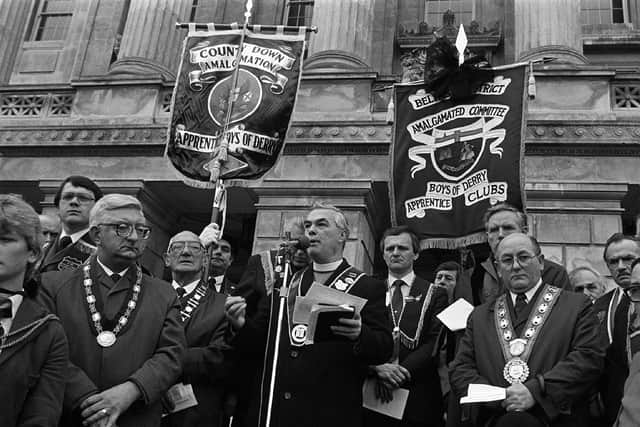

And thirdly, “That, at this great juncture in the future of empire, we desire to express our devoted loyalty to, and sympathy for, our beloved Sovereign now in the time of her bereavement, and to record our admiration of the splendid bravery and endurance of her soldiers in South Africa, conspicuous among whom are our own gallant countrymen, and of those noble offshoots of the motherland, our colonial brethren, whose united deeds have welded together the empire and given bright token of the strength and safety in a dark and stormy time.”
The South African war was also mentioned in remarks made by the Rev D McMeekin at the Harryville Branch in Ballymena when he compared the emergency that Britain now found itself with the heroics of the Apprentice Boys in 1688.
He said: “Great emergencies produce great men. Waterloo produced Wellington, Trafalgar a Nelson, Khartoum a Kitchener, Pretoria a Roberts and Derry the Apprentice Boys.” He continued: “Derry was not saved by one saying ‘I am an Episcopalian’ and another saying ‘I am a Presbyterian’ but by all saying ‘We are Protestants contending for the truth’. It was as a united people that he had fought and bled for all wars of the State. There must be union among Protestants. We must be united in the present day for the times are ominous of evil.”
Advertisement
Hide AdAdvertisement
Hide AdThe Relief celebrations in Londonderry were to be marred later in the week with serious rioting, reported the News Letter. It was reported that factory workers, principally employed by Messrs Tillis and Henderson, had clashed with nationalist demonstrators who were chanting their support for the Boers and waving green and white handkerchiefs.
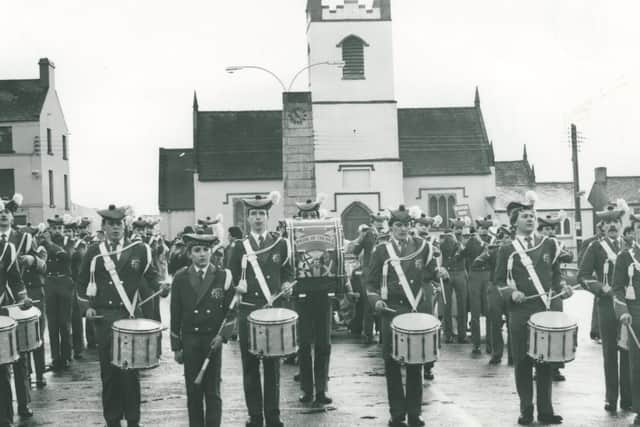

Serious stone-throwing took place between the two opposing factions in Fountain Street and Long Tower. Before the police had a chance to restore order many windows had been smashed and in one incident a girl was badly cut about the face when she was hit by a bottle.
TRAINS AND BUSES BRING THOUSANDS TO THE MAIDEN CITY
The Apprentice Boys of Derry celebrated the 239th anniversary of the Relief of Derry in 1928 with an imposing demonstration which was attended by tens of thousands of Apprentice Boys and Orangemen, reported the News Letter.
It was to be an important day for members of the Baker Club which had been revived in 1927. They gathered at 8.45am assembled inside the bastion at the Governor Walker Memorial Pillar. Bro M Kerr, governor, presided and Bro E McIntyre, president of the club, presented Mrs T Cabena, WM, of WLOL 29, with a pair of silver scissors, and she unfurled the new crimson flag of the club. As the flag unfurled the No Surrender Flute Band played The Relief, noted the News Letter’s correspondent who attended the ceremony. Miss Kathleen Hamilton then presented Mrs Cabena with the bouquet of flowers.
Advertisement
Hide AdAdvertisement
Hide AdEarly morning special trains poured into the city in 1928 bringing thousands of loyalists from all parts of the Province for the day’s celebrations. On the Great Northern Railway three special trains came from Belfast, one from Lurgan and Banbridge, one from Portadown, Keady, Milford and Armagh, and one from Strabane and Donegal. The trains carried some 5,000 processionists to the Maiden City.
There were also three specials on the Midland Railway, one from Antrim and intermediate stations up to Ballymoney, one from Coleraine, and one from Monkstown and Mossley, which combined brought almost 3,000 Apprentice Boys and Orangemen.
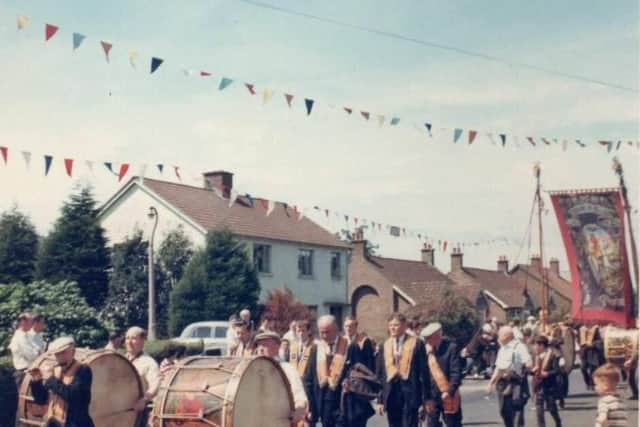

In addition to these the ordinary trains brought large contingents, while scores of buses brought hundreds more, bringing the number of visiting brethren to well over 10,000, and these were to be combined local brethren from Londonderry and surrounding districts.
And as special trains were bringing the visiting brethren to the Maiden City, the members of the parent clubs made preparations for the initiation of the visitors as members of the Apprentice Boys of Derry, an ancient rite which can only performed “within the walls”. These initiations, noted the News Letter’s correspondent had “been increasing annually, and this year the number touched record dimensions”.
Advertisement
Hide AdAdvertisement
Hide AdThe ancient walls were the rallying point for the procession which was headed Bro M Kerr, governor, Bro A Birney, lieutenant-governor, Bro S J Taylor, general treasurer, Br A White, MC, MM, general secretary, Br W N Cross, secretary of the Belfast Committee of Amalgamated Branch Clubs, Bro Sir Malcolm McNaghten, KC, MP, Bro M S Moore, HML, and Bro Marshall McKay, ex-governor.
The procession marched in the following order reported the News Letter: Abercorn Pipe Band, Apprentice Boys of Derry, Lurgan, Banbridge, Ballymena, Belfast, Newtownards, Broughshane, Portadown, Carrickfergus, Scarva, Markethill, Tammamore, Newtownhamilton and Dungannon branches.
There then followed the No Surrender Flute Band, Walker Club, Belfast; Kilrea, Armagh and Castledawson branches; the Rosemount Flute Band and Mitchelburne Club, Portadown, Belfast, Derryhale, Anticlare, Antigirvan, Sion Mills, Gavetagh, Blaugh, Macosquin, Killowen, Gilford, Ardboe, Cookstown and Fintona branches.
Moleman Pipe Band followed with the Thiepval Memorial Accordion Accordion Band along with No Surrender Club, Belfast, Limavady, Lisburn, Corlea, Keady, Bovenagh and Ardendarriff, Omagh and Convoy branches.
Advertisement
Hide AdAdvertisement
Hide AdNext came the Churchill Flute Band followed by Browning Club, 30th Old Boys Flute Band, Belfast, Ardstraw, Edenderry, Magherafelt and Bangor branches.
The Maiden City Flute Band then followed accompanied by the Baker Club, Belfast branch; Springfield Amateur Temperance Flute Band, Murray Club, Belfast, Antrim, Donemana, Eglington, Ballyclare, Newtownstewart branches and the Hamilton Flute Band.
Visiting Orange lodges and Royal Black Preceptories also marched in the procession. In the ranks of thousands, noted the News Letter, was one Mr John Ferguson who was walking in his 51st procession on the anniversary of the Relief.
On leaving the walls, the brethren marched into the Diamond where an impressive ceremony took place. The Abercorn Pipe Band played the Londonderry Air while the procession made its circuit of the Diamond which was itself thronging with people. Sir Malcolm McNaghten MP, accompanied by the governor and deputy, then placed a wreath of crimson roses on the war memorial for the Apprentice Boys’ Associated Clubs in memory of their fallen brethren. Mrs T Cabena, WM, of WLOL 29, on behalf of the Orangewoman of Londonderry also placed a wreath on the memorial.
Advertisement
Hide AdAdvertisement
Hide AdThe wreath laying ceremony was followed by two minutes silence, which was observed impeccably after which the pipes played Abide With Me and the National Anthem.
Addressing the Apprentice Boys’ service in St Columb’s Cathedral, the preacher, the Rev J C Rutherford of Belfast, warned the congregation of the great dangers of communism.
He said: “There is a dark cloud that is overshadowing the Empire. Its name is Bolshevism or communism. We must ensure that the Red Flag is not planted in our province.”
And as for the threat from the Irish Free State, the Rev Rutherford said: “We have always been free and we will not readily bow the knee to the yoke of a Southern Parliament.
Advertisement
Hide AdAdvertisement
Hide Ad“At times we are scolded by rebel politicians in both the north and south for being stubborn and spiteful in not welcoming a united Ireland. Such an attitude showed a woeful ignorance of loyal Ulster.”
He concluded, their reply to those politicians was, as Londonderry had said more than two centuries before, “No surrender!” and in a clear reference to the Boundary Commission he added that what Ulster had, Ulster would hold.
Do you have any old marching heritage photographs that you would like to share with News Letter readers? If so, get in touch, email [email protected].
Comment Guidelines
National World encourages reader discussion on our stories. User feedback, insights and back-and-forth exchanges add a rich layer of context to reporting. Please review our Community Guidelines before commenting.